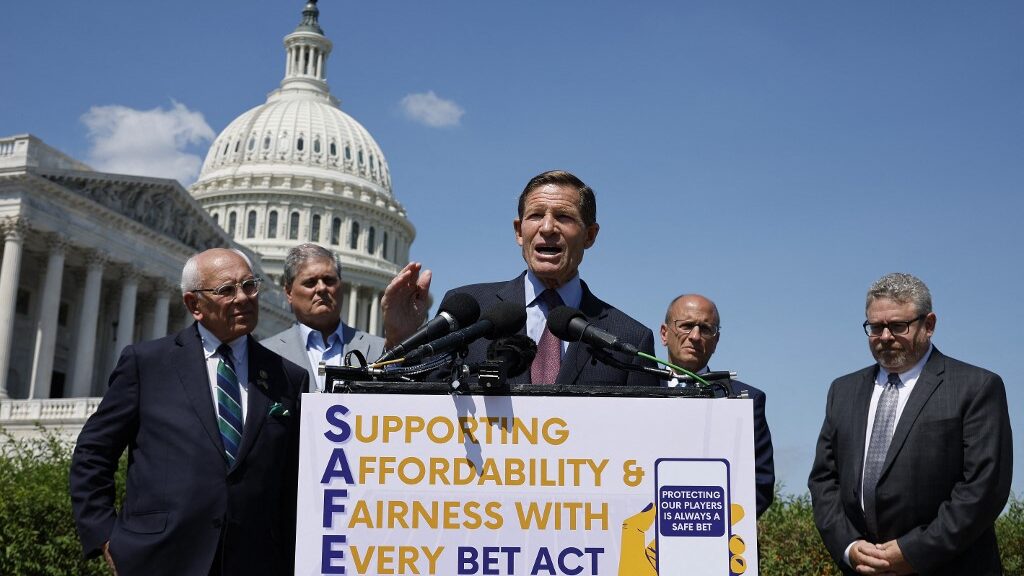
Representative Paul Tonko (D-NY) led a panel of student-athletes and coaches to discuss the increase in harassment they have been subjected to on social media and the correlation it has with sports betting.
SAFE Bet Act
It used to be disgruntled fans would swear at their TVs and howl at the moon regarding a bad loss by their hometown college football or basketball team. But then the internet came along, which allowed fans direct access to those players and coaches who underperformed or made a critical mistake.
However, the legalization of sports betting in many states has only added fuel to that fire, and Representative Paul Tonko believes that federal intervention is necessary, which is why he and Senator Richard Blumenthal (D-CT) have been touting their bill, the SAFE Bet Act, which focuses on three areas: advertising restrictions, customer deposit limits, and banning artificial intelligence to track customers’ gambling habits.
The bill also calls for an outright ban on all college prop betting.
Those three categories are explained as follows:
Advertising
- No sportsbook advertising during live sporting events, and no programming designed to induce gambling with “bonus”, “no sweat,” “bonus bets,” or odds boosts.
Affordability
- Prohibits operators from accepting more than 5 deposits from a customer in a 24-hour period
- Requires operators to conduct ‘affordability checks’ on customers before accepting large wagers and prohibits operators from accepting deposits via credit card
Artificial Intelligence
- Prohibits the use of AI to track players’ gambling habits and offer individualized promotions
- Prohibits the use of AI to create gambling products, such as microbets
“This bill is an effort designed to prevent harm before it occurs,” Tonko said at a press conference. “To be clear, we are in no way attempting to ban sports gambling; our goal is the opposite. The SAFE Bet Act will ensure that gambling on sports is safe for the public to enjoy.”
Blame Game
Siena College in upstate New York was the site of Tonko’s roundtable discussion on Thursday of last week with student-athletes and coaches.
“The embarrassing thing is the public messages that are directed at the players because a lot of times they don’t feel like they can defend themselves,” Siena men’s basketball coach Gerry McNamara said. “There was always a fanatic component, but now you have the financial component (with sports betting), and that is where the threats get more serious.”
Brendan Coyle, a junior forward on the Sienna men’s basketball team, said, “We got ripped into a lot last year on social media and in my (direct messages) as an individual. It was a variety of things, from death threats to fans being upset after a loss.”
According to an NCAA study, abusive comments regarding sports betting and fixed games made up more than 12% of the comments directed at student-athletes.
The elimination of college player prop betting would theoretically take much of the focus off individual players. This would ostensibly lead to a reduction in the social media harassment and threats the student-athletes are experiencing.
“States have legalized mobile sports betting but with no guardrails and no restraints, making it possible for this Wild West environment to continue,” Tonko said. “The layer upon that is microbetting, where every (aspect of the game) can be bet on. It’s no longer just ‘will Siena beat its opponent?’”
Moreover, NCAA President Charlie Baker has been vocal in his support for a nationwide ban on college player prop betting, calling on state legislatures to prohibit their sportsbook operators from offering them. “Sports betting issues are on the rise across the country, with prop bets continuing to threaten the integrity and competition and leading to student-athletes and professional athletes getting harassed. The NCAA has been working with states to deal with these threats, and many are responding by banning college prop bets,” Baker said in a statement.















